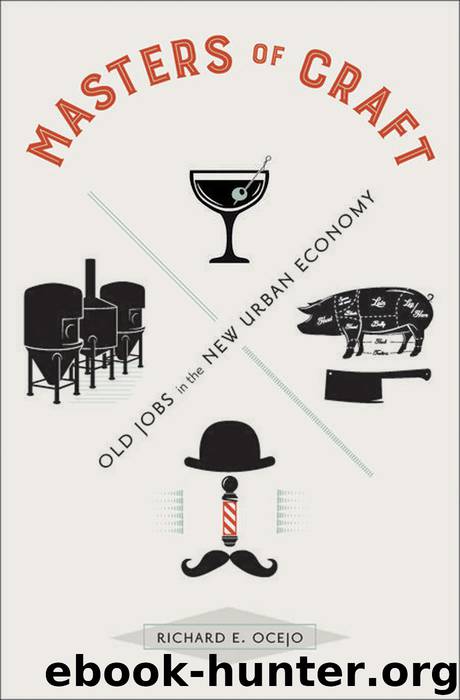Masters of Craft by Ocejo Richard E.;

Author:Ocejo, Richard E.; [Ocejo, Richard E.;]
Language: eng
Format: epub
ISBN: 9780691165493
Publisher: Princeton University Press
Published: 2017-01-15T07:00:00+00:00
Using the Senses, Harnessing Time
Given the role of nature, an important aspect of these workers’ work is learning to control and harness it, specifically where and when in the process and how to do so. They place a strong emphasis on training their bodies’ senses to know when and how, and on their potential to use their senses and abilities to manipulate time. Time for these workers is both a constraint and a luxury. It structures the work they do.5 Each occupation has moments when workers feel pressure to work quickly. It could be during a shift, such as when the post-work crowd walks into a cocktail bar, a time of the week, such as Fridays and Saturdays at barbershops, or a time of the year, such as during the holidays at butcher shops.6 But owners of these businesses deliberately design their method of operation to give their workers more time to do what they need to do to make a quality product and provide a quality service. The aim is not slowness per se, although they do their jobs more slowly than other versions of these occupations in the sense that it takes them longer to accomplish their main objective (make a drink, make a spirit, cut hair, cut meat). The goal is to do their jobs “right.”
Each occupation requires workers to have well-honed senses. Cocktail bartending demands the use of all five of them. Taste is perhaps the most obvious. Like chefs, cocktail bartenders aim to sharpen their palates to identify the flavor profiles in ingredients, for the sake of discovering combinations for new drinks and for explaining what’s in a cocktail and why it tastes as it does to customers. Tasting is what they mainly focus on in their educational programs. And of course, smell is integral to taste. Cocktail bartenders develop their palates and taste memories over time. They hone their senses of smell and taste by constantly sampling products.
“We’re always tasting and refining palates,” says John of PDT (Please Don’t Tell). “One of the things that you’ll see bartenders do specifically is that whenever we’re working behind the bar we’ll take a bottle and smell it, just so we’re registering the smell of a liquor, which helps us when we’re pairing something. It’s like, ‘Hey, I remember smelling something that would go good with this. It was this crème de violette. This would go really good with this drink I’m making now.’ So we’re trying to register smells and tastes somehow. There’s a lot to remember. We have fifty-six, sixty bottles behind the bar, each one very distinct from each other, especially when you get down to like gins and scotches and whiskeys. There are differences between them, like [Old] Overholt’s a more grassy rye, so knowing off the top of your head all these differences and how they match really helps with the drink design. So we’re always tasting and mixing.”
Less obvious in their work is the role of hearing, touch, and sight (beyond the obvious ability to see what they are doing).
Download
This site does not store any files on its server. We only index and link to content provided by other sites. Please contact the content providers to delete copyright contents if any and email us, we'll remove relevant links or contents immediately.
Nudge - Improving Decisions about Health, Wealth, and Happiness by Thaler Sunstein(7242)
iGen by Jean M. Twenge(5162)
The Fire Next Time by James Baldwin(5016)
Adulting by Kelly Williams Brown(4234)
The Hacking of the American Mind by Robert H. Lustig(4085)
The Sports Rules Book by Human Kinetics(4078)
The Ethical Slut by Janet W. Hardy(4040)
Captivate by Vanessa Van Edwards(3725)
Mummy Knew by Lisa James(3521)
In a Sunburned Country by Bill Bryson(3367)
The Worm at the Core by Sheldon Solomon(3325)
Ants Among Elephants by Sujatha Gidla(3279)
Suicide: A Study in Sociology by Emile Durkheim(2904)
The Slow Fix: Solve Problems, Work Smarter, and Live Better In a World Addicted to Speed by Carl Honore(2837)
The 48 laws of power by Robert Greene & Joost Elffers(2804)
Humans of New York by Brandon Stanton(2687)
Handbook of Forensic Sociology and Psychology by Stephen J. Morewitz & Mark L. Goldstein(2603)
The Happy Hooker by Xaviera Hollander(2584)
The Tipping Point by Malcolm Gladwell(2559)
